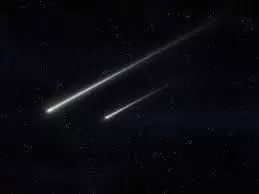Twin Meteor Showers To Light Up Night Sky: When, Where & How To Watch
Don’t miss the twin meteor showers on July 29–30! Watch Southern Delta Aquariids & Alpha Capricornids light up the skies with 25 meteors/hour.
The night sky will dazzle as twin meteor showers—Southern Delta Aquariids and Alpha Capricornids—peak together on July 29–30, 2025.

Stargazers are in for a rare celestial event as two meteor showers — the Southern Delta Aquariids and the Alpha Capricornids — are set to peak simultaneously on the nights of July 29 and 30, creating a dazzling sky show with at least 25 meteors per hour.
🌠 What’s Happening in the Sky?
This rare overlap of two meteor showers will fill the night sky with streaks of light. According to astronomers, both showers will be most visible in the early morning hours between 2 a.m. and 4 a.m., with the dim 27% moonlight enhancing visibility.
“Almost all meteor showers peak before dawn, so your best chance is after midnight,” said Nicholas Moskovitz, planetary astronomer at Lowell Observatory, in a statement to space.com.
☄️ Where Do These Meteors Come From?
Southern Delta Aquariids originate from Comet 96P/Machholz, which orbits the sun every five years.
Alpha Capricornids come from Comet 169P/NEAT, discovered in 2002.
As Earth crosses the dusty paths left by these comets, fragments burn up in the atmosphere, creating the meteors we see as shooting stars.
📍 When & Where to Watch in India
The peak viewing time is early morning on July 30, but shooting stars may be visible until August 12, especially near July 31. While best seen from the Southern Hemisphere, viewers in India and other Northern Hemisphere regions can still catch the spectacle by looking towards the southern horizon.
🔭 How to Get the Best View:
Watch after midnight, ideally between 2 a.m. and 4 a.m.
Find a dark spot away from city lights — rooftops or countryside locations are ideal
No telescope or equipment needed — just your eyes and a clear sky
🌌 A Celestial Treat You Shouldn’t Miss
If cloudy skies spoil your view, don't worry — the showers will continue for over a week. With no special gear required, this is a perfect chance to enjoy nature’s light show — just step outside and look up.

